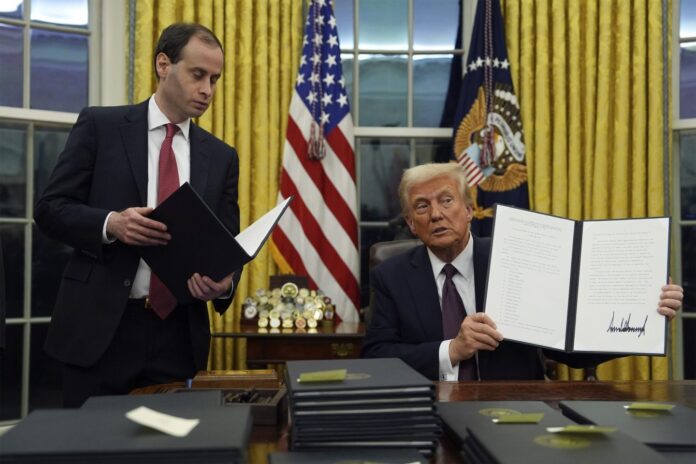On his first day back in the Oval Office, President Donald Trump issued a sweeping pardon to over 1,500 individuals charged in connection with the January 6, 2021, Capitol riot. This bold move includes people convicted of assaulting police officers and those involved in high-profile conspiracies to overturn the 2020 election results.
This act of clemency wasn’t unexpected—Trump had long hinted at plans to “set things right” for those he called “patriots” and “hostages” of what he described as politically motivated prosecutions. However, the speed and scope of his pardons stunned many. The decision effectively undid years of work by the Justice Department, which had undertaken its largest investigation in history to prosecute those responsible for one of the most infamous days in modern American history.
Among those released is Enrique Tarrio, leader of the Proud Boys, who had been serving a 22-year sentence, and Stewart Rhodes, founder of the Oath Keepers, who was convicted of seditious conspiracy. Trump also commuted the sentences of 14 others convicted of similar charges.
“We’re turning a page,” Trump said in a statement, describing the prosecutions as part of a “national injustice.” He framed the pardons as an act of reconciliation, urging the country to move forward.
Outside the Washington jail, Trump supporters cheered and waved flags as news of the pardons spread. Many families of the defendants expressed gratitude, calling the decision a long-overdue acknowledgment of unfair treatment. Lawyers for those freed shared statements of optimism, highlighting their clients’ relief at being able to return to their families.
“This is a turning point,” said an attorney for one pardoned individual. “We’re hopeful this signals a brighter future.”
But not everyone saw it that way. Critics lambasted the move as a direct insult to justice. Former Speaker Nancy Pelosi called the pardons “a slap in the face to law enforcement and democracy.” Senate Democratic Leader Chuck Schumer described it as “a dangerous precedent” that would embolden those who defy the rule of law.
Michael Fanone, a former police officer who was attacked by rioters on January 6, expressed shock and anger. “This is what people voted for,” he said. “I risked my life that day, and now the people who caused that chaos are walking free.”
The Capitol riot left deep scars—both physical and emotional. Hundreds of police officers were injured, and the chaos was broadcast live to millions across the world. Rioters smashed windows, stormed offices, and sent lawmakers fleeing for safety.
In the years that followed, more than 1,500 people were charged for their roles in the attack, with over 1,000 convictions. Many were sentenced to prison terms, while others faced probation or fines. Videos from that day captured rioters armed with weapons ranging from flagpoles to stun guns.
For Trump, however, the events of January 6 were a rallying cry. Throughout his campaign and return to power, he consistently portrayed those charged as victims of political persecution.
While Trump’s supporters see the pardons as justice served, others worry about the message this sends. Experts caution that the decision could embolden extremist groups, potentially fueling future unrest.
As the nation processes this unprecedented act of clemency, one thing is clear: the legacy of January 6 continues to stir deep divisions, shaping the political landscape in ways that will be felt for years to come.





